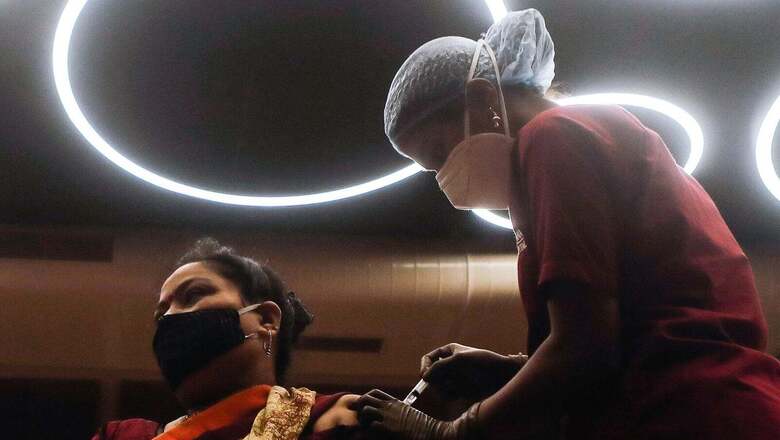
views
It has been 74 years since the British were forced to leave India, but the colonial hangover continues. Because nothing else explains the UK’s befuddled stand on vaccine certificates. This, after it had not included Covishield, the Indian brand name for the globally much-in-use AstraZeneca vaccine, in its accepted vaccine list.
Although the United Kingdom since then has reversed its earlier decision and included Serum Institute-manufactured Covishield in its vaccine list—the new rules come into effect only from October 4—fully vaccinated travellers from India will still be required to undergo self-isolation for 10 days after arriving in Britain. Why this discrimination, you may ask? Because, the UK has doubts regarding India’s vaccination certification process (read CoWin). Or rather, it believes that vaccine certificates from 18 other approved countries in its advisory list are somehow supposed to be better than India’s.
India’s vaccine certificate, which comes with a QR code, is Aadhaar-authenticated and almost tamper-proof, is better than the paper vaccine cards (and which can be easily faked) issued by some of the more developed countries of the world. But travellers from these developed countries have quite expectedly been exempted from the mandatory quarantine in Britain.
This high-handedness was also on display when Covishield was not included in the UK’s eligible vaccine formulations list. To question the genuineness of a country’s vaccine which has exported over 66 million jabs all over the world, including to the UK, smacked of inconsiderateness and thoughtlessness.
Perhaps, the decision-makers in London don’t take India seriously.
ALSO READ | Nod to Covishield, Not to CoWIN Certificate: UK’s Another Slip Between the Cup and the Lip
Unwise and Arbitrary Decision
New Delhi is not pleased with the development. Prime Minister Narendra Modi’s tweet, while not naming any country, called for recognition of our vaccine certificates: “We also need to focus on addressing the pandemic’s economic effects. To that end, international travel should be made easier, through mutual recognition of vaccine certificates.”
Earlier, on Monday, External Affairs Minister S. Jaishankar had raised the issue of discrimination against India with his British counterpart Liz Truss on the sidelines of the UN General Assembly in New York.
Foreign Secretary Harsh Shringla too reacted. He said at a media briefing the next day that India could think of “reciprocal measures” against the nations which don’t recognize our country’s vaccine certification. Shringla went on to add that Covishield is a licensed product of a UK company that is made in India. Further, the UK government itself requested for five million Covishield jabs; India did export these which were used by the National Health Service. Against this backdrop, “non-recognition of Covishield is a discriminatory policy and does impact on those of our citizens travelling to the UK.”
And arbitrary, he might have added. A vaccine can’t be good for the NHS beneficiaries and bad for Indians travelling to the UK.
Thankfully, sane counsel prevailed in London. A British High Commission spokesperson said after the earlier rejection raised a firestorm in India: “We are engaging with the government of India to explore how we could expand UK recognition of vaccine certification to people vaccinated by a relevant public health body in India.”
It needs to be mentioned here that it is not the first time that the UK has been accused of vaccine discrimination against Indians. On August 8 this year, it had removed a 10-day self-isolation in a government-approved facility, at the cost of 1,750 pounds per head, but only those who got their jabs in the UK or Europe were exempted from home quarantine. The Department of Health and Social Care (DHSC) had made it clear that the arrivals from India would not benefit from the exemption.
In the latest flare-up too, the UK government’s decision comes across as unwise and arbitrary.
Besides a tit-for-tat warning from the Indian government, some sharp and caustic remarks have come from the Opposition too.
Senior Congress leader Jairam Ramesh tweeted, “Absolutely bizarre considering Covishield was originally developed in the UK and The Serum Institute, Pune has supplied to that country too! This smacks of racism.”
His party colleague and author Shashi Tharoor told a media platform: “Why should Indians be deemed to be lesser breeds than others? It is deeply offensive that fully vaccinated Indians have to quarantine, while others who may have taken the same vaccine in other countries, do not.”
A Case of Overreaction
It is correct that the UK authorities acted in a manner that was hasty and ham-handed, but the trigger was not unreal. BBC reported last month, “The World Health Organization (WHO) said it has identified counterfeit versions of India’s primary Covid vaccine, Covishield.”
Further, the report said, “The doses were seized by authorities in India and Africa between July and August, a WHO statement said. It also said the vaccine’s maker, Serum Institute of India, confirmed that the doses were fake.”
Whatever may be the truth about counterfeit vaccines, it cannot be brushed under the carpet. At least that is not what responsible nations do. It is, however, quite evident that the British authorities overreacted to a fear which has been expressed by a body, the WHO, whose credibility has been seriously questioned.
“It has been claimed that duplicate versions of Covishield vaccine were sold in the country. The Indian government is probing this claim and will take action if it found any substance to the allegations,” Health Minister Mansukh Mandaviya had said in the third week of August.
Interestingly, there hasn’t been any major report in the media—including in the section severely critical of the Narendra Modi government—suggesting that counterfeit jabs have become a big problem. The UK, however, seems to have seen a big problem with India’s vaccination programme. Much to the detriment of the India-Britain ties.
The author is a freelance journalist. The views expressed in this article are those of the author and do not represent the stand of this publication.
Read all the Latest News , Breaking News and Ukraine-Russia War Live Updates here.


















Comments
0 comment